新概念一册lesson117课文及插图教学内容
新概念英语第一册117课课件45358教学教材
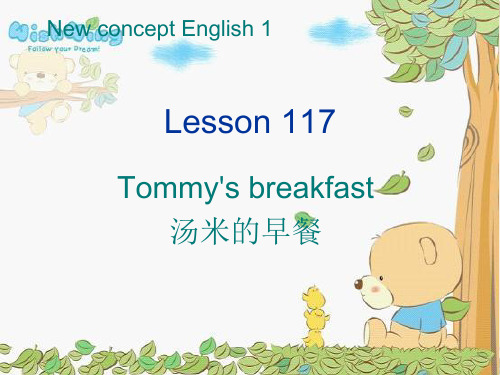
Theyห้องสมุดไป่ตู้were not watching TV. 3、疑问句:was/were + 主语+ 现在
分词
Was he writing a letter last night?
❖ 常用时间状语
When, while, a moment ago, from nine to ten last evening, at that time ❖ when既指时间点,也可指一段时间, while只指 一段时间,因此when引导的时间状语从句中 的动词可以是终止性动词,也可以是延续性动 词,而while从句中的动词必须是延续性动词。
o’clock last night.
Practice Time!
1. While she ___ TV, Penny ___ asleep.
A. watches, was falling B. was watching, fell C.was watching, was falling D. watch, fell KEY: B
7. Mike and I___(play) basketball at that time yesterday afternoon.
课文讲解
❖ When my husband was going into the dining room this morning, he dropped some coins on the floor.
❖ There were coins everywhere. We looked for them, but we could not find them all.
❖ everywhere 到处 ❖ look for 寻找(强调动作和过程) ❖ find 找到 (强调寻找的结果) ❖ 我找遍了任何地方都找不到我的钢笔。
新概念一117课精美课件

今天8:00am
他正在看书。
He is reading a book.
她正在看书。
She was reading a book.
昨天8:00am
过去进行时
1.构成
主语+was/were +现在分词
2. 过去进行时的基本用法
1)表示过去某一时间正进行的动作。 They were shaving at seven this morning. 今晨7点钟的时候他们正在刮胡子。
bedroom
kitchen
卧室
厨房
coin 硬币 note 纸币
Swallow
1)v. 吞……,咽……
He swallowed (up) the madicine with water.
他把药和水一起吞下。
2)n.燕子
later
1)adv. 后来,较迟地,较后地 three days later 三天后
Lesson 117 Tommy’s breakfast
dining room
饭厅
n.硬币
n.嘴 v.吞下 adv.后来
coin
mouth swallow lining room dining table
饭厅,餐室 餐桌
sitting room / living room 客厅
几天后他们要离开。
Homework: 上课:周日10:10--12:10 作业:1.预习119 2.初中卷子
Thank you !
sooner or later 早晚,总有一天
2)adj. 较迟的,较后的,更近的 in one’s later life 在晚年
toilet
n. 厕所,盥洗室
新概念英语NCE1_lesson117-118-119课件

the room.
•
她正在擦鞋时,乔治敲门了。
•
Just as she was cleaning her shoes, George knocked at
the door.
•
我做饭时,他正在花园里劳作。
•
While I was cooking the dinner ,he was working in the
• When I left, it began to rain. • When I saw him, he was drinking some tea. • 当我到达伦敦的时候,天黑了下了。 • 昨天晚上十点我正在看电视. • 当Mary正在做早饭的时候,我正在看报纸
过去进行时
• 概念:
•
1、在过去某个特定的时间正在进行或发生的动作。
•
2、当过去的一个动作发生的时候另外一个动作正在
进行。
• 结构:
•
S+ was(were)+ doing
•
S+ wasn’t(weren’t) +Ving
•
Was(Were) +S +Ving?
•
I was reading a book at 7 o’clock yesterday.
•
I wasn’t reading a book at 7 o’clock yesterday.
★swallow v. 吞下
•
① v. 吞下,咽下
•
Tommy had swallowed the coins.
•
② v. 抑制,使不流露
•
She swallowed a smile and sat there still.
新概念英语第一册117-118课课件

swallow n.吞下
6
第六页,共30页。
toilet n.盥洗室
7
第七页,共30页。
单词(dāncí)学习
• dinning room(hall)
饭厅
• c oi n
n. 硬币
• m ou th
n. 嘴
• s w a ll ow
v. 吞下
• l a t er
adv. 后来
• t oi l e t
find it. • all是them的同位语 • them all = all of them
18
第十八页,共30页。
• While we were having breakfast, our little boy, Tommy, found two small coins on the floor.
year. • Nazi Germany nearly swallowed up the whole Europe in World
War II. • 第二次世界大战中,纳粹德国几乎吞并了整个欧洲。
15
第十五页,共30页。
• later • 1) adv. 后来,较迟地,较后地 • 回头见 • see you later. • 三天后 • three days later • 他比平常(píngcháng)来得晚。 • He came later than usual. • 2〕adj. 较迟的,较后的,更近的。 • 我们搭晚一点的火车吧。 • Let’s take a later train.
17
第十七页,共30页。
• There were coins everywhere. We looked for them, but we could not find them all.
新概念英语第一册117课 课件(共17张PPT)
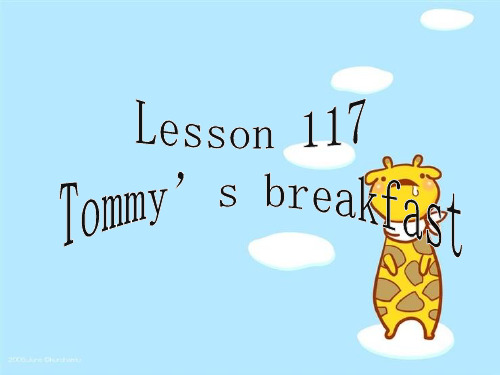
• 5. The train left when I was buying the tickets.
• 6. It rained heavily when I was driving to London.
A. is having B. have C. has D. was having
4. What ____ you ____from 7 to 9 yesterday ? A. were, doing B. did. do C. have, done
5.Look! Lily with her sister __ a kite on the playground.
shaving
cut
Exercise P239
• 1. He knocked at the door when I was answering the phone.
• 2. He came downstairs when I was having breakfast.
• 3. The phone rang when I was washing the dishes.
过去进行时VS现在进行时
结构
现在am/is/are+v-ing 过去was/were+v-ing
The students are drawing pictures now.
The students were drawing pictures when the teacher came in.
3.时间状语:
New words and expressions
dining room
新概念英语第一册第117-118课课件
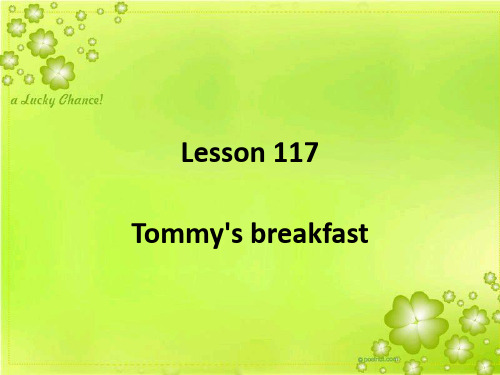
mouth n. 嘴
• • • • • • • • Open your mouth. 嘴里塞满食物时不要说话。 Don’t talk with your mouth full! It sounds funny in your mouth. 这种话由你的口中说出来,听起来就很可笑 a useless mouth光吃不做的人, 饭桶 a big mouth[美俚]碎嘴子; 说话冒失的人; 爱吹牛, 说大话的人 Tom was born with a silver [golden] spoon in his mouth.汤姆生 于富贵之家。 • from hand to mouth 勉强糊口 • from mouth to mouth口口相传的
• He put them both into his mouth. We both tried to get the coins. But it was too late. Tommy had already swallowed them! • put sth +介词短语 把…东西放在… • 把书放在桌子上 • Put the books on the desk. • both表示“两个都…” • 他们俩都想去法国。 • They both want to go to France. • 三者或三者以上用all • 他们大家都幸福 • They were all happy.
• • • • • •
• • • • •
2.表示过去某一阶段一直在进行的动作。 他们昨天在等你。 They were waiting for yesterday. 她去年在写一部小说。 She was writing a story last year. 3.表示从过去某一个时间的角度看将要发生的 动作,用于某些瞬间动作;go, come, leave, stay, fly 等。 几天后他们要离开。 They are leaving in a few days. They were leaving a few days later. 他告诉我他的哥哥要到苏州去。 He told me that his brother was going to Suzhou.
新概念英语第1册-第117-118课(共24张PPT)
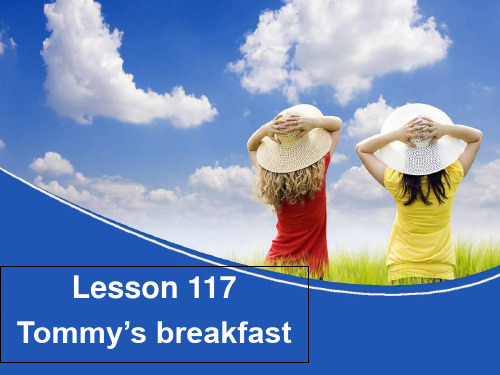
Grammar
1.构成 • was/were +现在分词
过去进行时
• 疑问句式 把 was/were 提前
• 否定句式 在 was/were 的后面加 not
• 例: He was watching TV when I called him
yesterday.
• I was washing clothes at 9 o’clock yesterday.
例:他到处找他的钢笔,但是找不到。 He looked for his pen everywhere, but he couldn’t find it. • them all=all of them, all为them同位语 例:We all like apples.= All of us like apples.
Video
Key words&expressions
• dining room • coin • mouth • swallow • later • toilet • ring
n. n. v. adv. n. v.
饭厅 硬币 嘴 吞下 后来 厕所 响
Key words&expressions
★dining room • dining table • sitting room / living room • bedroom • kitchen • balcony • garden
Grammar
• When the teacher came in, we were talking.
• While we were talking, the teacher came in.
• They were singing while we were dancing.
新概念英语第一册第117课课件讲课讲稿

117课 过去进行时练习: 一、仿照例句用所给 的词汇造句。
1. I, see him, he, cross the street I saw hi m while he was crossing the street. (He was crossing the street when I saw him.) A. the sun, shine, we, come out B. she, study at college, the war, break out C. she, work in a factory, the city, be liberate d (放) D. he, lose his pen, he, go sightseeing in th e city
阅读课文回答问题
What does the she mean by ‘change’ in the last sentence ?
再看一遍课文
When my husband was going into the dining room this morning
he dropped some coins on the floor.
定语从句的先行词是名词或代词;而同位语从句的先行词只能是 名词,而且仅限于idea,plan,fact,theory,promise,hope, news,doubt,truth,information,suggestion,question, thought,belief,conclusion等少数名词。
本课语法同位语
同位语,代表一个名词(或其它形式)对另一个名词或代词进行 修饰,限定或说明。同位语与被它限定的词的格要一致,并常常紧 挨在一起。
由两个或两个以上同一层次的语言单位组成的结构,其中前项与 后项所指相同,句法功能也相同,后项是前项的同位语其中常用 ‘and’连接。
新概念英语第一册第117课(课堂PPT)

117课 过去进行时练习: 一、仿照例句用所给 的词汇造句。
1. I, see him, he, cross the street I saw hi m while he was crossing the street. (He was crossing the street when I saw him.) A. the sun, shine, we, come out B. she, study at college, the war, break out C. she, work in a factory, the city, be liberate d (放) D. he, lose his pen, he, go sightseeing in th e city
17
1. While we __________ (wait) for the bus, a girl __________ (run
) up to us.
2. I __________ (telephone) a friend when Bob __________ (com
e) in.
3. Jim __________ (jump) on the bus as it __________ (move) aw
1
阅读课文回答问题
What does the she mean by ‘change’ in the last sentence ?
2
再看一遍课文
3
When my husband was going into the dining room this morning
4
he dropped some coins on the floor.
新概念英语第一册第117-118课件

n. 嘴
Open your mouth.
张开(zhānɡ kāi)你的嘴。
Shut your mouth.
闭嘴〔口〕
face, eyebrows, eye, nose, ear, mouth
from hand to mouth 勉强糊口
from mouth to mouth 口口相传的
have a big mouth
arrived. v 当他刮胡子的时候,他伤到他自己了。 v He cut himself while he was shaving. v 当我妻子在做饭的时候,我在花园里工作。 v My wife was cooking the dinner while I was
working in the garden.
第十一页,共36页。
Key words and expressions
• 三天后 • 回头见,再见 • 早晚,总有一天 • 他比平常(píngcháng)
来得晚
• three days later • see you later • sooner or later • He came later than
Pay a person back in his own coin. 以其人之道还治其人之身。 你能把这个一美元的纸币换成硬币吗?
Could you change the one-dollar note into coins?
第九页,共36页。
Key words and expressions
★ mouth
v
v 这个箱子太重,我搬不动。 v The box is too heavy for me to carry.
第十五页,共36页。
新概念英语第一册第117课完整ppt课件

阅读课文回答问题
What does the she mean by ‘change’ in the last sentence ?
精选ppt
再看一遍课文
精选ppt
When my husband was going into the dining room this morning
精选ppt
续的或同时发生的,那么主从句的动词都可用过去
进行时。
精选ppt
本课语法过去进行时
1.过去进行时由“主语+was/were+动词ing”构成 2.过去进行时的否定式由“主语+was/werenot+现 在分词”构成 3.过去进行时的疑问式由“was/were+主语+现在 分词”组成 句型 肯定句=主语+was/were+doing+其它 否定句=主语+was/were+not+doing+其它 一般疑问句问语=Was/Were+主语+doing+其它 答语:Yes,Iwas/were.或No,Iwasn't/were’t. 特殊疑问句=特殊疑问词精+选p一pt 般疑问句+其它
精选ppt
本课语法
1.look for,寻找(强调动作过程);find,找到(强调寻找的结 果)。 2.Tommy had already swallowed them! 汤米已经把硬币咽了下去 句中用了过去完成时形式 had swallowed。过去完成时用来表示过去 两个动作中发生在前的那个动作。显然,句中咽下硬币的动作发生在 夫妇俩能够把硬币从汤米手中抢过来之前。 3.later that morning,那天上午的晚些时候。 later是副词late的比较级。 4.any change change是个多义词,既有“零钱”的意思,也有“变化”的意思。此 处既可指“硬币”;也可指“情况的变化”。这是双关(pun /p)n/) 修辞法。
新概念117课 课件
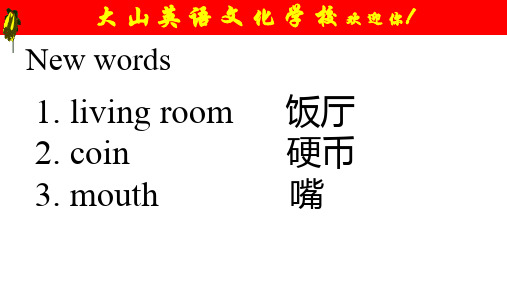
4.look for sb/sth. 寻找某人或某物(动作过程)
find ... 找到……
(强调结果)
大 山 英 语 文 化 Байду номын сангаас 校 欢 迎 你!
练习
1.My husband was going into the living room.
W__h__a_t _w__a_s_ _y_o_u_r_ husband _d_o_i_n_g_?
大 山 英 语 文 化 学 校 欢 迎 你!
New words
1. living room 2. coin 3. mouth
饭厅 硬币 嘴
大 山 英 语 文 化 学 校 欢 迎 你!
L117 Tommy's brekfast 汤米的早餐
1. When my husband was going into the dining room this morning, he dropped some coins on the floor.
W__e_re_ _y_o_u_ _sl_e_e_p_i_n_g_ at this time yesterday?
大 山 英 语 文 化 学 校 欢 迎 你! 2.drop sth. +介词短语 把某物掉到某处
3. everywhere =_h_e_r_e_ and _t_h_e_r_e__ 处处,到处
2. He dropped some coins on the floor.
W__h_e_r_e_d_i_d_ he _d_r_o_p__ _a_n__y_ coins?
大 山 英 语 文 化 学 校 欢 迎 你!
练习
3.There were coins everywhere.
新概念英语第一册117课课文

第一部分:课文内容概述1. 本课文的主题是关于一个英国青年在拉夫堡市的一天生活。
课文通过描述这位青年的早晨起床、上班、和同事聊天的情景,展现了英国人的日常生活和工作状态。
2. 文中描绘了拉夫堡市的风景和周围环境,给人一种宁静和美好的感觉。
3. 整篇课文语言简洁明了,句式通顺,适合英语初学者阅读。
第二部分:课文详细内容分析1. 课文描述了主人公早晨起床的情景。
他在床边的一张小桌上放着一本书,表明他是一个勤奋好学的年轻人。
2. 主人公走进浴室刷牙洗脸,整洁的卫生间和洁净的毛巾显示了他对生活的态度。
3. 主人公穿着整洁的衣服,准备去上班。
他走出家门,沿着宁静的小路前行,远处是美丽的风景,仿佛展现了英国乡村的宁静和祥和。
4. 在工作中,主人公和同事聊天。
他们谈论着工作和生活,频频爆发笑声,给人以轻松愉快的感觉。
第三部分:课文背景介绍1. 拉夫堡是英国一个古老的城市,位于英格兰中部,是一个具有悠久历史的城市。
城市周围的乡村风景秀丽,适合居住和度假。
2. 课文中描绘的主人公可能是一个在拉夫堡市工作或学习的年轻人,他的生活方式和工作状态反映了英国年轻人的一般生活状态。
3. 整个课文的背景可以让学习者更好地了解英国的社会环境和英国人的生活习惯,有助于提高学习者的英语阅读能力和语言水平。
第四部分:课文启示1. 通过学习这篇课文,读者可以了解到英国人的日常生活和工作状态,增加对英国文化的了解,丰富自己的英语词汇和语法知识。
2. 课文描述了拉夫堡市的风景和周围环境,可启发读者去感受自然之美,增加对英国风景的向往和热爱。
3. 阅读这篇课文可以培养学习者的阅读理解能力和语言表达能力,激发学习英语的兴趣,提高英语学习的自信心。
第五部分:总结回顾1. 新概念英语第一册117课的课文《A day in the country》通过对英国青年一天的生活进行描述,展现了英国人的日常生活和工作状态,同时描绘了拉夫堡市的风景和周围环境。
